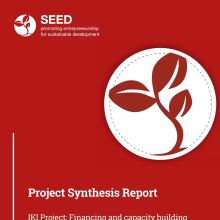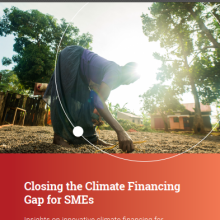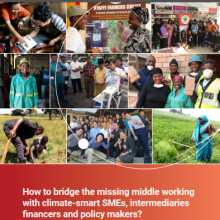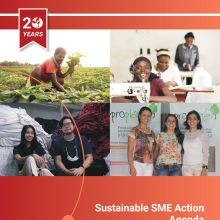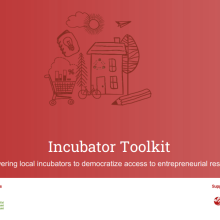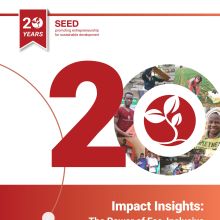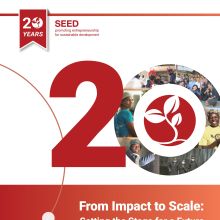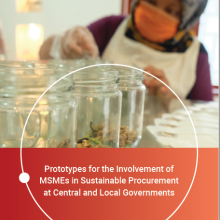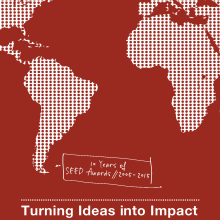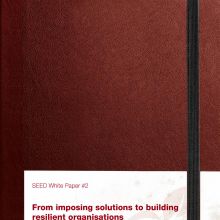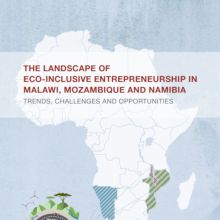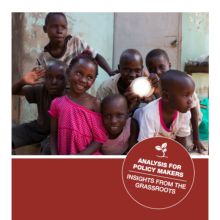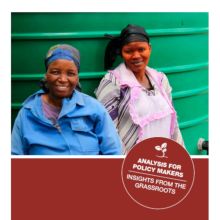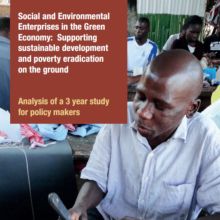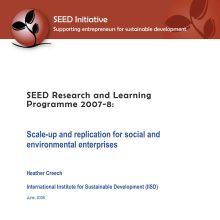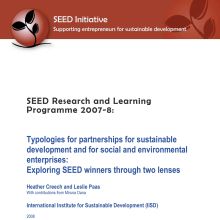This report summarises the results and outputs from the International Climate Initiative (IKI) financed SEED project: Financing and capacity building for micro and small climate-smart enterprises. Filling the gap of the missing middle from 2019-2024.
This report draws on the insights and action-oriented research from the SEED Practitioner Labs Climate Finance (PLCF) and the SEED Green Finance Academy (GFA) in the years 2019-2023. It also builds on the lessons from 20 years of experience of the SEED Programme supporting climate-smart SMEs along their scale-up and finance journeys.
The objective of this impact report is to gain consolidated impact insights and lessons learned from the International Climate Initiative (IKI) financed SEED project: Financing and capacity building for micro and small climate-smart enterprises: Filling the gap of the missing middle.
To scale Green SME Support for 2030, SEED, GO4SDGs and UNEP jointly build on their collective experiences to formulate lessons learned and critical next steps to inform this Sustainable SME Action Agenda. Validated through a global consultation process involving key regional SME Stakeholder, this Action Agenda outlines critical next steps to empower the micro, small and medium-sized enterprises and build forward better.
Launching an incubation program for Micro, Small, and Medium Enterprises (MSMEs) requires a strategic approach to nurture and accelerate their growth. Our Incubator Toolkit is designed to guide incubators in developing comprehensive programs tailored to the unique needs of these MSMEs. From initial assessment to post-incubation support, this toolkit equips you with methodologies and best practices, to foster innovation and improve their business capabilities. This toolkit empowers incubators to not only guide MSMEs towards success but also to adapt and evolve with the ever-changing business landscape, ensuring long-lasting impact and resilience.
Celebrating SEED’s first 20 years and aware of the work that remains to be done, we take this opportunity to share valuable insights into the environment of eco-inclusive enterprises and the BDS ecosystem. Have a look at our 20 Year Impact Flagship Report: The Power of Eco-Inclusive Enterprises and BDS Providers.
In honour of SEED’s 20th anniversary, this report aims to assess 2 decades of SEED’s work and takestock of what has been accomplished. Within 20 years, SEED has supported 2000 enterprises in 41 countries across 3 continents. These enterprises are the champions of the green transition. Working on the ground, they target the most severe impacts of climate change across 6 key sectors: biodiversity, green technologies, clean energy, sustainable agriculture, waste management and water, sanitation and health.
The involvement of local MSMEs that provide sustainable goods and services in government procurement systems can drive the transition to a sustainable economy, provide job opportunities and local economic development, and accelerate the recovery from the Covid-19 pandemic.
Keterlibatan UMKM lokal yang menyediakan barang dan jasa berkelanjutan dalam sistem pengadaan barang dan jasa pemerintah dapat mendorong transisi menuju perekonomian berkelanjutan, memberikan lapangan kerja dan pengembangan ekonomi lokal, serta mempercepat pemulihan dari pandemi Covid-19
Over the last ten years SEED has supported more than 200 social and environmental enterprises enabling collaboration and peer learning. SEED’s inspiring success story and significant key lessons have now been captured with a 10 Year Flagship Report.
This White Paper shares our lessons learned from 15 years of experience in providing non-financial support to eco-inclusive enterprises. It shall offer inspiration as well as guidance to critically reassess the way we do non-financial support and how we can improve impacts. The findings and conclusions expressed in this paper are based on research and expert discussions at the SEED Africa Symposium 2016, a survey of BDS providers in the SEED network, interviews and discussions with BDS providers and SEED Winners.
This White Paper offers inspiration as well as guidance towards initiating collaboration between different actors offering replication support services for eco-inclusive enterprises. The findings and conclusions expressed in this paper are based on research and expert discussions at the SEED Africa Symposium 2016. This is the first white paper of a new SEED White Paper Series.
This sectoral policy brief provides an short overview to policy-makers and practitioners of the common challenges faced by eco-inclusive enterprises in this strategic sector in South Africa. The brief is designed to guide policy-makers and practitioners in the prototyping and implementation of measures to ensure the success and scaling-up of eco-inclusive enterprises in South Africa.
One of the SEED focus areas for 2016 includes eco-inclusive entrepreneurship in Malawi, Mozambique, and Namibia. Eco-inclusive entrepreneurship is an important market-based solution for economies transitioning to sustainable growth trajectories while providing essential services for the marginalised populations of these emerging economies. This report is part of an effort to support the sector through improved research, building the track record for eco-inclusive enterprises and highlighting their ‘triple bottom line’ impact and contribution towards green growth.
- Sustainable Future of Agro-Processing: Policy Pathways for Eco-Inclusive Enterprises in South Africa
Innovation of the agro-processing sector has been identified – and supported through policy measures and funding initiatives – as central to the low carbon, inclusive economic transition in South Africa. Small and medium-sized eco-inclusive enterprises in the sector play a pivotal role in mitigating the impacts of climate change and tackling poverty and social inequalities.
To protect biodiversity, we need to create alternative economic opportunities for the people who depend on the world’s most biodiverse ecosystems. Biodiversity is the foundation of human well-being and prosperity. At the same time, human activities are its greatest threat. In particular, biodiversity hotspots like savannahs, forests and coral reefs are under pressure due to unsustainable tourism development and the livelihood needs of low-income communities.
This report draws insights from a three-year study of the performance of social and environmental micro enterprises and tackles two important questions. Firstly, whether and how micro and small social and environmental enterprises make contributions to social, environmental and economic progress within their communities; and secondly, what the enabling factors and barriers towards making such contributions are.
This report draws insights from a three-year longitudinal study of the performance of social and environmental micro enterprises and tackles two important questions. Firstly, whether and how micro and small social and environmental enterprises make contributions to social, environmental and economic progress within their communities; and secondly, what the enabling factors and barriers towards making such contributions are.
Energy and agriculture form a nexus. On one hand, energy can be generated by using crops, agricultural residues, and livestock waste. On the other hand, substantial amounts of energy are required along the agricultural and food processing value chain, accounting for around 30 % of the global energy consumption.
In the face of climate change, we urgently need to find pathways to a low-carbon economy. Only then can we improve the well-being of nine billion people by 2030 and achieve the Sustainable Development Goals (SDGs). Developing countries have to leap-frog to a low-carbon economy while continuing to improve well-being. Innovative eco-inclusive enterprises are already implementing low-carbon solutions while also providing social and economic benefits to those who need them most. This study shows how the replication of eco-inclusive entrepreneurial solutions tackles the double challenge of mitigating climate change and improving well-being, therefore arguing that they should be strategically incorporated in global and national plans for achieving a low-carbon economy.
This report draws insights from a three-year longitudinal study of the performance of social and environmental micro enterprises and tackles two important questions. Firstly, whether and how micro and small social and environmental enterprises make contributions to social, environmental and economic progress within their communities; and secondly, what the enabling factors and barriers towards making such contributions are.
Small, micro and medium enterprises (SMMEs) that pursue a triple bottom line approach offer one concrete means of achieving this shift to a Green Economy. This report highlights grassroots eco-enterprises, the types of impact they are achieving and the challenges and opportunities they face.
SEED has worked closely with the Gordon Institute for Business Science in 2015 on a study that integrates for policy-makers the findings of five case studies in South Africa. As concerns with accomplishing SDG goals have become inextricably lodged within social and policy debates, scholars studying SMMEs have developed understandings of enterprises embedded within complex institutional environments. The current study has looked how SEED Winners in South Africa progress in achieving their triple bottom line objectives, taking into account challenges they encounter along the way, and success factors that have enabled them to move forward.
SEED has worked closely with the International Institute for Sustainable Development (IISD) since 2007 on a programme of research to increase technical knowledge and understanding about small-scale social and environmental enterprises. Based on the research and Symposia consultations, SEED was able to publish the following Analysis for Policy Makers, which provides new insights into the role of micro and small social and environmental enterprises as essential actors in building green economies.
- SEED ha trabajado estrechamente con el Instituto Internacional para el Desarrollo Sostenible (IIDS) desde 2007 en un programa de investigación para aumentar el conocimiento técnico y la comprensión de las pequeñas empresas sociales y ambientales. Sobre la base de la investigación y las consultas de los simposios, SEED pudo publicar el siguiente Análisis para los responsables de la creación de políticas, que ofrecen nuevas perspectivas sobre el papel de las microempresas y las pequeñas empresas sociales y ambientales como actores esenciales en la construcción de economías verdes.
This study provides insights into how eco-inclusive enterprises can enhance their social, environmental and business impacts and how policymakers can create a more enabling environment for such enterprises to thrive.
Eight critical success factors and fourteen performance indicators have been identified through the investigation of SEED Winners and other social and environmental entrepreneurs.
This paper explores how the international development community approaches scale-up and replication, and in particular its role in supporting start-up social and environmental enterprises with a view to expanding their business and their social and environmental impacts.
This paper suggests that developing partnership management is one critical success factor for social and environmental entrepreneurs but is not the defining modus operandi. It presents seven other critical success factors based on empirical evidence gathered from eco-inclusive enterprises.

